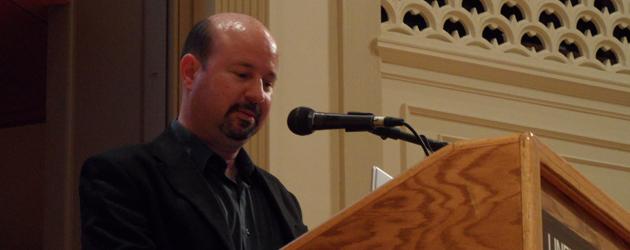
A renowned climatologist presented his collaborative research regarding climate change and discussed the controversy surrounding global warming during a guest lecture May 11.
Dr. Michael Mann, who has visited schools across the United States, talked about the impacts and predictions that he and others in his field have proved to exist.
Linfield and McMinnville High School sutdents, along with professors and community members, attended the lecture.
“Mann was passionate about the
topic and even questioned the research at times, which makes him more credible because he isn’t just accepting it,” freshman Brittany Baker said.
Most of what Mann presented came from his book, “Dire Predictions: Understanding Global Warming,” that he co-authored with fellow scientist Lee R. Kump.
Global warming has received a lot of negative publicity lately and has caused animosity between people who believe it exists and those who do not believe it was caused by human activity, Mann said. He also said the issue has also caused scientists to disagree.
“Recently, the emphasis has been on controversy, most of it manufactured controversy, which plays into the agenda of people who doubt climate change,” Mann said. “However, it’s about how much the temperature is changing, not the fact that it is changing.”
Controversies arise from questions of whether humans are responsible for global warming, if it is a natural occurrence or if humans are contributing to the natural process.
During his lecture, Mann said that many people’s doubts about global warming stem from the fact that they do not understand the concept clearly.
Global warming is caused by greenhouse gas emissions. They can occur naturally or result from the contribution of human actions, such as burning coal, raising cattle and emitting pollution from factories, Mann said.
Greenhouse gases prevent heat energy from leaving the Earth, which, in turn, causes the planet’s temperature to increase.
“Global warming does not mean a uniform warming of the Earth,” he said. “The land is warming
faster than the water and at a gradual rate over time.”
When talking about his and other scientists’ findings, Mann displayed several slides that showed graphs, charts, pictures and areas of Earth that have increased in temperature.
He also pointed to evidence of global warming that can be seen from summer of 2003, in Europe, which was the hottest European summer in at least 500 years, Mann said.
Other evidence includes the glacial retreat, sea ice receding, sea levels rising and more extreme weather conditions, such as hurricanes.
Following the lecture was a Q-and-A session in which audience members asked specific questions regarding the science and research behind global warming. Mann, whose lecture was devoid of much jargon, used more technical terms during the questioning.
“I understood most of his lecture, but he lost me during the Q-and-A section,” Baker said.
Before his lecture, Mann visited several classes throughout the day to speak about the global warming and to enlighten students about ways to slow down the process.
Some of these preventative measures include water management and decreased car emissions, he said.
“It’s all about adaptation,” Mann said.
Mann, who is from the Departments of Meteorology and Geosciences and Earth and Environmental Systems Institute, is the director of the Earth System Science Center at Penn State University.






